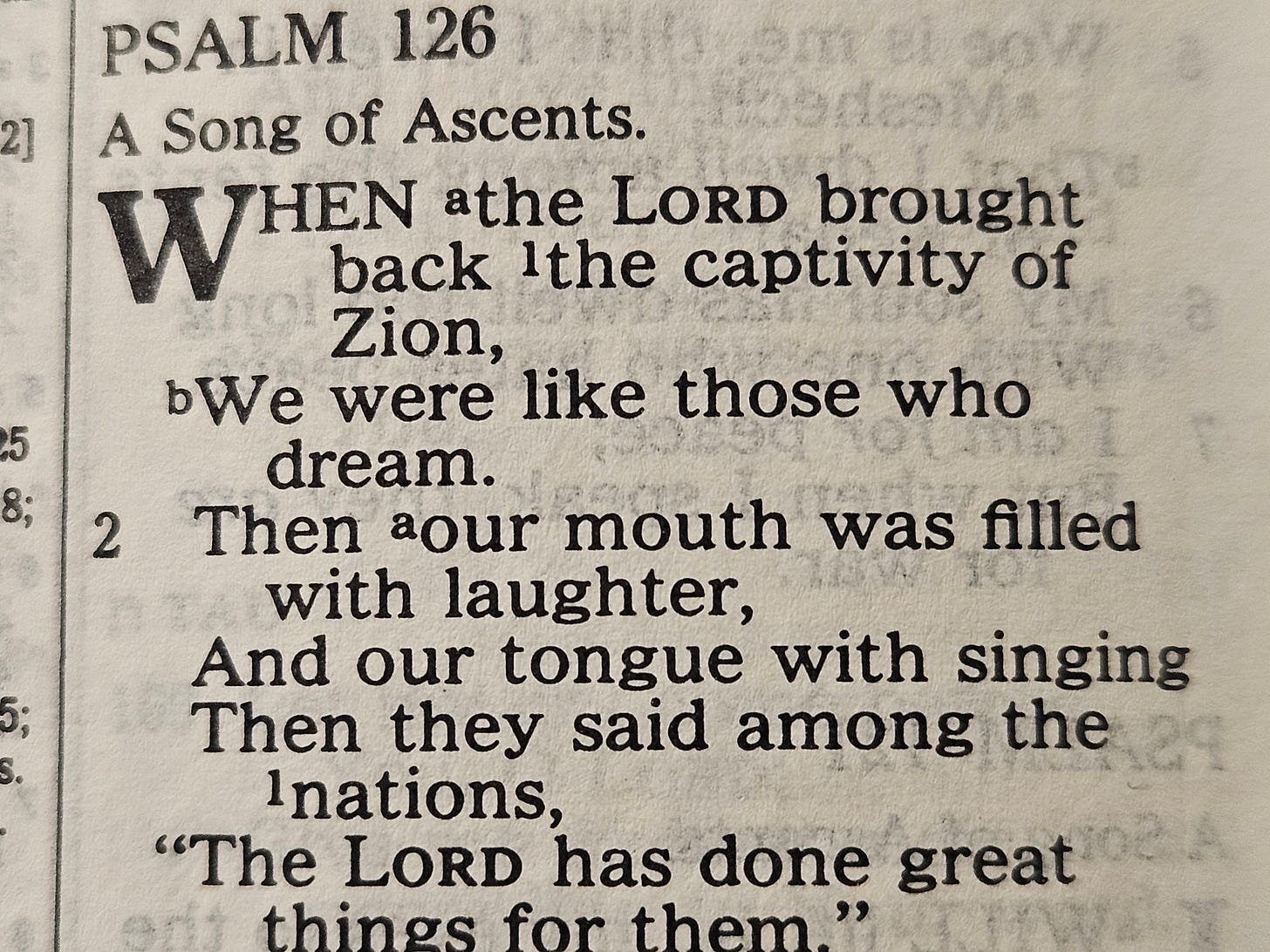(Wednesday What-Not IS totally free. Your subscription is a helpful donation. Thanks!)
/ We are like those who dream! Psalm 26
/ Wednesday What-Notters: Thank You!
/ Martin Luther: Genesis is a Handbook of Prayer
In the Worldwide Bible Class (and remember: that’s this morning at 9:00 am Texas time) we are studying Luther’s Genesis lectures. His two main themes: prayer and suffering. This is amazing.
I collected a number of passages from Luther’s commentary on Genesis 26-37 on prayer, and posted them here: Genesis as a Handbook of Prayer (22 excerpts from Luther’s Lectures)
Here’s another:
Retaining Hope and Prayer. Therefore in such tribulations the heart must be prepared to be patient, in order that we may take God’s judgment in good part; for nothing will harm us, who are repentant, do not participate in the sins of the ungodly, and pray earnestly. But woe to those who will have to drink the dregs! For such people become worse as a result of the punishment ordained for them and do not acknowledge the sin they have committed. They cry out and rage because of the misfortune. They are not sorry for their sin. If you cried out because of sins, God would hear you; but since you hide, excuse, and defend sin, “I will not hear your cry about the punishment,” says the Lord. This should be considered in regard to the reason for this very sad and sudden fall of Esau, in order that we may learn to understand and shun the reasons for punishments, and in order that in the common dangers we may retain hope and prayer, lest we be overcome by the misfortunes and desert to the godless. (LW 5:171)
I’ve gathered 22 of what I think are the best passages about prayer. I hope these will bring you wisdom and joy.
(And, psst, this is from a larger project on prayer that is almost finished. I’m excited to share that with all of your in the next few weeks.)
/ Greece Tours
It looks like there’s going to be a Lutheran invasion of Greece next year.
Pr Flamme is leading a tour that will run parallel to ours, September 9-20. Learn more here.
Pr Packer is leading a tour this summer, July 5-14. Learn more here.
/ On the Line, Part 2
Here’s the second interview I did with Brian Stecker On the Line. These conversations were a lot of fun, and this one, in particular, was helpful to me to keep sorting out the theory of the differences between Lutherans, Evangelicals, and Roman Catholics.
That theory also can up in last week’s Issues, Etc interview about Myths about Lutheranism: Lutherans are really just Roman Catholic.
/ Angel Joy
[From this little book I’m working on…]
Angel Joy
The three lost and found parables of Luke 15 are all about joy, but we should note carefully who is joyful. We don’t know if the sheep is joyful about being rescued in the wilderness, but we are told that the shepherd, “when he has found it, he lays it on his shoulders, rejoicing. And when he comes home, he calls together his friends and neighbors, saying to them, 'Rejoice with me; for I have found my sheep which was lost.'” (Luke 15:5-6)
Again, we don’t know how the silver coin felt about being found and rescued from the dusty corner, but we know about the woman. “When she has found it, she calls her friends and her neighbors together, saying, 'Rejoice with me; for I have found the piece which I had lost.'” (Luke 15:9)
It is not the joy of the found that Jesus mentions, but the joy of the finder, and the joy of his or her friends.
This is the joy of heaven, the joy of the angels. “I say unto you, that likewise joy shall be in heaven over one sinner that repents, more than over ninety and nine righteous persons, who need no repentance.” (Luke 15:7) “Likewise, I say unto you, there is joy in the presence of the angels of God over one sinner who repents." (Luke 15:10) “It was good and right that we should make merry, and be glad: for this your brother was dead, and is alive again; and was lost, and is found.” (Luke 15:32)
The angels rejoice over a salvation that was not for them.
The angels cannot be saved. But the angels rejoice in a salvation that is not their own. They rejoice in the repentance of sinners, in the forgiveness of sins, in the kindness and mercy of God the is not for them but for us.
The angels are not the object of the Lord’s saving work, but the observers. They watch and wonder while rejoicing that God is good and kind to undeserving creatures.
The parable calls us into this joy. We are the lost sheep, yes, but we are also the shepherd’s friend. We are the lost coin, true, but we are also the woman’s neighbor. We are the prodigal son, but we are also the older brother, and the joy into which we are invited is not only the joy of our salvation, but the joy of other peoples’ salvation, the joy of the Lord’s saving work for the entire world.
Please add your own theological recommendations in the comments.
If you are new here, visit the archives for a ton of stuff. (You can even search for your favorite topics.)
Remember to go to your pastor's Bible Class this week and, read old theology books. (If you don't have a pastor or congregation, click here. If you don't have old theology books, click here.)
If you find this helpful, forward it to a friend. If this was forwarded to you, click here to sign-up for yourself.
Thank you, again, for your time and attention, and for your prayers. Please keep in touch.
Christ is Risen!
Pastor Wolfmueller
2 Corinthians 1:3-4
Support Wednesday What-Not
Get some YouTube Theologian merch
Books | Everbook | YouTube | website | certificates | Devotions
(Wednesday What-Not IS totally free. Your subscription is a helpful donation. Thanks!)





Pastor Wolfmueller, Perhaps you're going to get to this at another place in your book: The shepherd rejoices to find the lost sheep. The woman searching rejoices in the found coin. There is "rejoicing in the presence of the angels". They are in the presence of God. Don't all of these point to God Himself rejoicing?